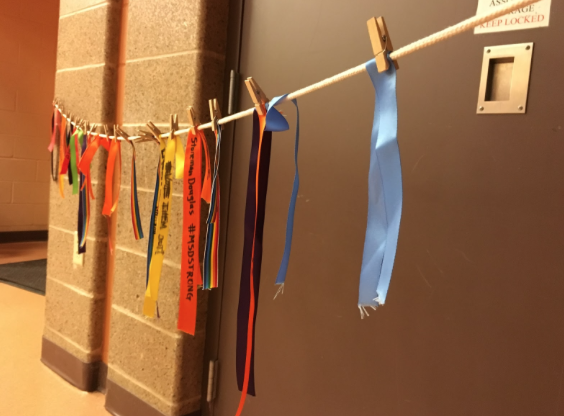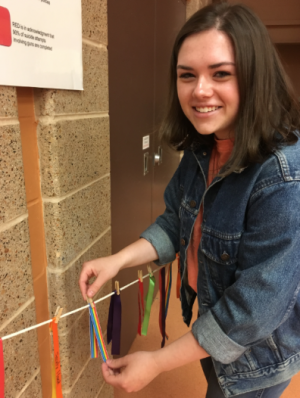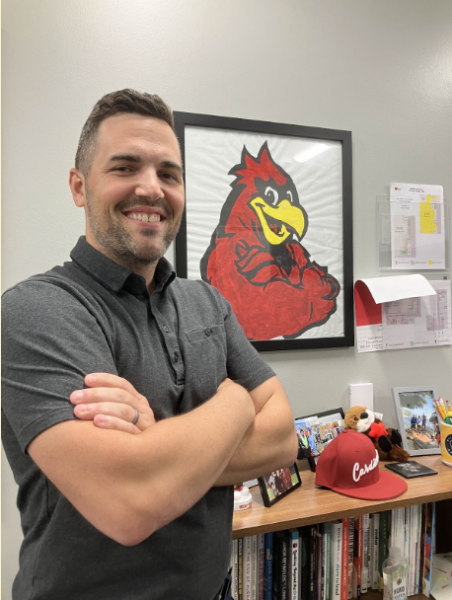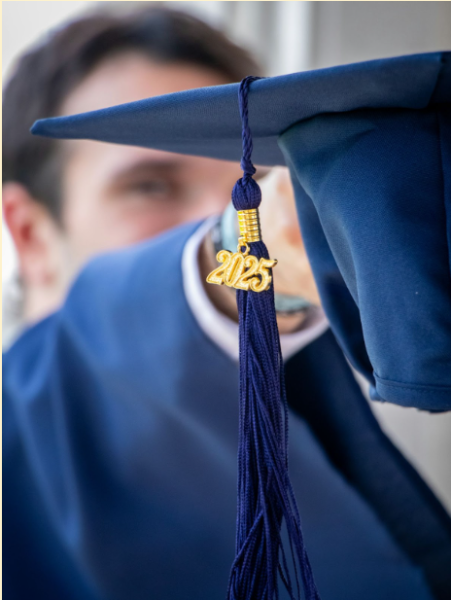Next Steps for Teenage Gun Control Activists

Ribbons displayed on a clothesline by attendees of Madison’s Wear Orange event for gun safety.
June 18th marks one month since a mass shooter opened fire and killed ten students at Santa Fe High School in Santa Fe, Texas.
For many people, another school shooting feels numbing; it’s no longer a surprise to look at the television and see a list of casualties rolling across the screen. But countless teenage gun control activists across the country, including here at Middleton High School, are refusing to let another tragedy make them feel hopeless. Instead, they are raising their voices and rising up to continue the fight for gun control reform in America.
Some teenagers, such as sophomore Syd Smith, are showing support for the cause by attending local gun safety events like Madison’s Wear Orange Weekend event that was held on June 2nd. Wear Orange Weekend was a national event to “turn America orange” (the color for gun safety) following National Gun Violence Awareness Day on June 1st. Madison held an event at the East Madison Community Center on the Saturday of that weekend. At the event, Smith took pictures to spread awareness on her social media platforms, hung up a ribbon in support of LGBTQ people who are disproportionately affected by gun violence, and listened to various speakers.

in support of LGBTQ people at
Madison’s Wear Orange event.
Smith discussed that she is creating change by continuing the conversation about gun control with the people in her life. She also explained, “I’m going to keep showing up, I’m going to keep putting the pressure on politicians . . . [Us] kids who are leading this charge, we are going to be able to vote soon. And we are very conscious of who to vote for and who to not vote for when thinking about our safety.”
Akshay Kelshiker, a sophomore who identifies as Republican, has similar ideas. “The best thing we can do is use our First Amendment to talk about the topic,” he said. “Because we can’t vote at this point, but eventually we can.”
Kelshiker is anti-gun, which is traditionally not a Republican stance. He detailed that his views about gun control stem from his parents’ upbringing, as they both came from the United Kingdom, a very anti-gun country. As a result, Kelshiker is very supportive of restrictions on AR-15s and precautionary measures such as investigating people who post threats of gun violence on social media. He plans to show support for these ideas by speaking out and spreading awareness.
These ideas also match those of Keylah Buchner, a sophomore who has been very active on social media regarding gun control. Buchner recently posted on Instagram, hoping to start a conversation in the comment section of her post.
“Las Vegas, Parkland Texas church, Orlando, San Bernardino, Oregon college – just a few examples of mass shootings in the past decade – were all a success in taking lives through LEGALLY OWNED GUNS,” she wrote. “Yes, none of those shooters (they don’t deserve to be named) obtained their weapons illegally. So, the argument that ‘gun control won’t work isn’t exactly true. It may not solve all mass shootings, but why not prevent these people from getting weapons in the first place?”
Buchner concluded her post with a call to action to her followers: “This is America, and we should be coming together to better our nation — not tear it apart and abandon it.”
Buchner said that she is active on social media because she wants to spread facts and information to the people around her as well as share her personal views. “Because that’s the biggest problem — ignorance,” she said.
Erica Collin, also a sophomore, believes that ignorance is one of the most substantial issues surrounding this movement. She has had personal experience with people being ignorant about the facts of gun control laws, during the first semester, she formulated a gun control bill that went to Full Session for U.S. Government and Politics class.
“On the topic of gun control, a lot of people are uneducated,” Collin said. “A lot of people think it’s a mental health problem, but it’s not a mental health problem. People with mental illnesses are actually more likely to be victims of violent crimes like gun shootings than [to] commit a crime.”
Despite the ignorance surrounding the topic, Collin believes that change will arrive in the years to come because the student activists that are leading this charge will be able to vote soon. She believes that current teenagers will vote the politicians that do not support gun control out of office.
But Collin is not waiting until she can vote to make a change, she hopes to organize another protest for gun control at the Wisconsin State Capitol. “In history class, we learned about Vietnam, and all the student protesters [who] did a die-in on the steps of [the] capital,” she said. “And I thought if we get some hundred kids just to show how many kids have died in the past year of gun control — just, look dead on the capitol steps. I think that would be really powerful.”
Liam Casey, a graduated senior, agrees that another protest will probably be coming soon. “I don’t think the protests are going to stop,” he affirmed. “I think more high schoolers are going to take it up as other high schoolers leave . . . and people are going to keep talking about it, keep protesting, and likely plan more protests.”
Casey was one of the student organizers of Middleton March For Our Lives walkout on March 14th. He, along with other student leaders from Middleton High School, was one of the people at the front of the 3,000 strong crowd that marched down East Washington Street to the Wisconsin State Capitol building on that day. He also helped organize small events during the last day of Fine Arts Week, which was the anniversary of the Columbine shooting and the date of another national walkout.
Casey believes that although we have not seen any legislative evidence of change, the change is coming. “Legislation takes time,” he said. “I think it’s still in the process of happening, and the fact is, the protests [after Parkland] led to a bunch and bunch of people hearing about it, talking about, basically making it arguably the ticket item for the next set of elections.”
It is agonizingly slow, Casey agreed, but he is still optimistic. “I think if you have a country full of those many people who want something to change, it’s gonna change,” he explained. “It’s gonna take a while, it’s gonna be slow and painful, and there’s still gonna be [bad] days where you feel like ‘why don’t we have this legislation now?’ But I think gun control is on the right side of history. I think we’re going to see gun control laws in the future.”
Personally, Casey is fighting for legislative change by using his voice to contact representatives, participate in protests, and initiate the conversation with the people around him. He is also laying the groundwork to fight for long-term change in our country, as he is planning to study political science in college. “[I want] to learn the skills it takes to read a bill and write a bill [to] fight for what I believe in,” he added.
The activists interviewed in this article are just a handful of powerful teenagers at Middleton High School and across the country who are fighting for gun safety. While some may see the most recent mass school shooting in Santa Fe, TX, as a sign of hopelessness, these activists see it as a reminder that they cannot stop fighting for what they believe in.
And you should not stop fighting either. Whether you are a Democrat, Republican, or elsewhere on the political spectrum; whether or not you support banning AR-15s or stricter background checks; whether or not you agree with the March For Our Lives and other school walkouts, we can all agree on one thing: gun violence in America is a problem. So my question to you, is: what are you doing to help end gun violence?








